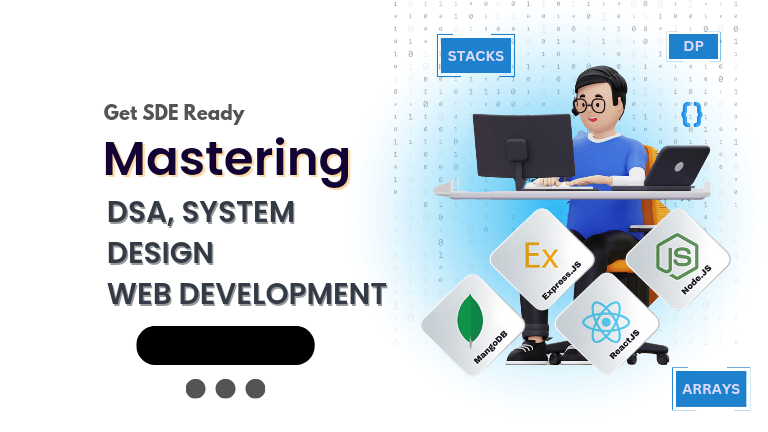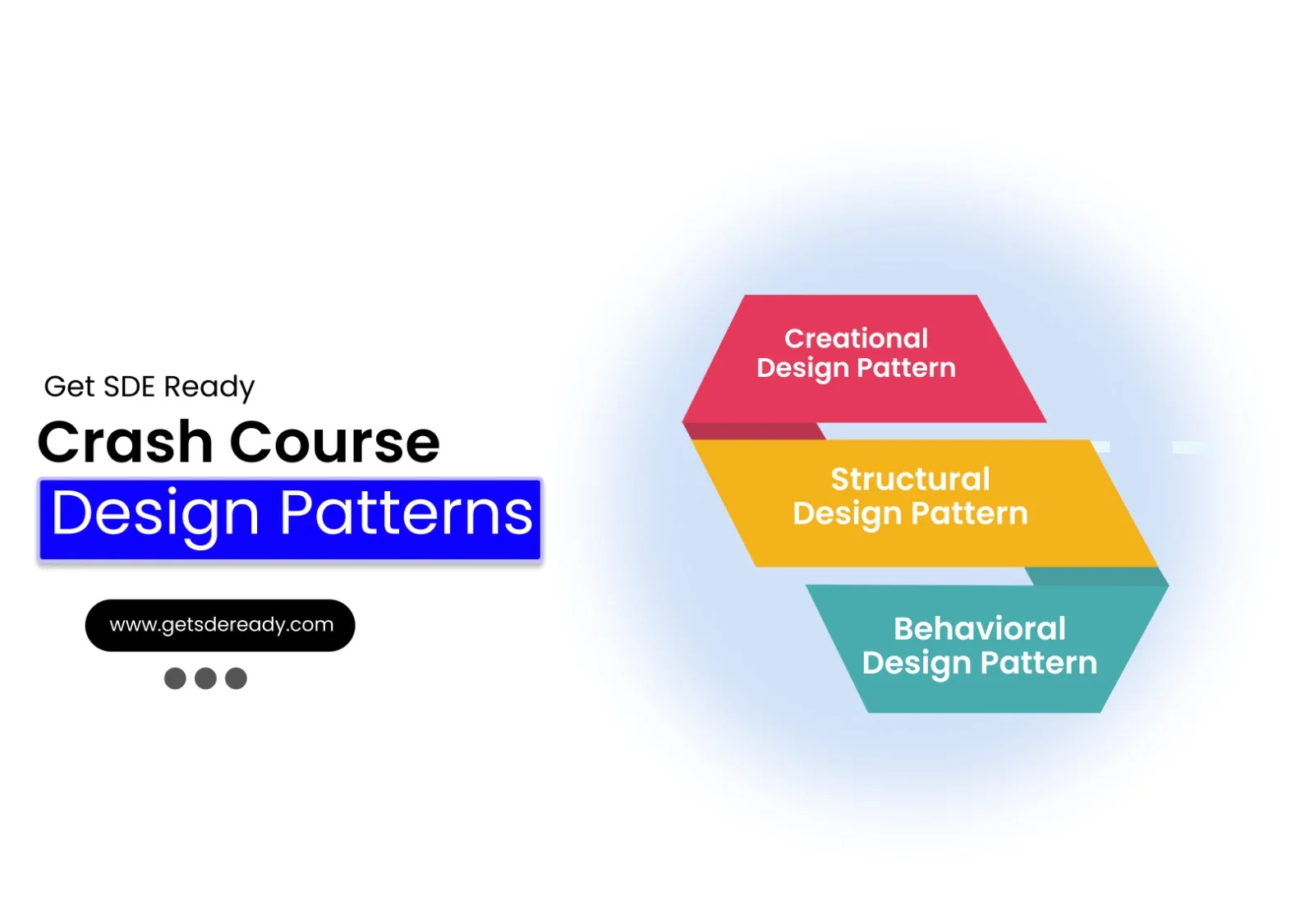Introduction to High-Level System Design
System Design Fundamentals
- Functional vs. Non-Functional Requirements
- Scalability, Availability, and Reliability
- Latency and Throughput Considerations
- Load Balancing Strategies
Architectural Patterns
- Monolithic vs. Microservices Architecture
- Layered Architecture
- Event-Driven Architecture
- Serverless Architecture
- Model-View-Controller (MVC) Pattern
- CQRS (Command Query Responsibility Segregation)
Scaling Strategies
- Vertical Scaling vs. Horizontal Scaling
- Sharding and Partitioning
- Data Replication and Consistency Models
- Load Balancing Strategies
- CDN and Edge Computing
Database Design in HLD
- SQL vs. NoSQL Databases
- CAP Theorem and its Impact on System Design
- Database Indexing and Query Optimization
- Database Sharding and Partitioning
- Replication Strategies
API Design and Communication
Caching Strategies
- Types of Caching
- Cache Invalidation Strategies
- Redis vs. Memcached
- Cache-Aside, Write-Through, and Write-Behind Strategies
Message Queues and Event-Driven Systems
- Kafka vs. RabbitMQ vs. SQS
- Pub-Sub vs. Point-to-Point Messaging
- Handling Asynchronous Workloads
- Eventual Consistency in Distributed Systems
Security in System Design
Observability and Monitoring
- Logging Strategies (ELK Stack, Prometheus, Grafana)
- API Security Best Practices
- Secure Data Storage and Access Control
- DDoS Protection and Rate Limiting
Real-World System Design Case Studies
- Distributed locking (Locking and its Types)
- Memory leaks and Out of memory issues
- HLD of YouTube
- HLD of WhatsApp
System Design Interview Questions
- Adobe System Design Interview Questions
- Top Atlassian System Design Interview Questions
- Top Amazon System Design Interview Questions
- Top Microsoft System Design Interview Questions
- Top Meta (Facebook) System Design Interview Questions
- Top Netflix System Design Interview Questions
- Top Uber System Design Interview Questions
- Top Google System Design Interview Questions
- Top Apple System Design Interview Questions
- Top Airbnb System Design Interview Questions
- Top 10 System Design Interview Questions
- Mobile App System Design Interview Questions
- Top 20 Stripe System Design Interview Questions
- Top Shopify System Design Interview Questions
- Top 20 System Design Interview Questions
- Top Advanced System Design Questions
- Most-Frequented System Design Questions in Big Tech Interviews
- What Interviewers Look for in System Design Questions
- Critical System Design Questions to Crack Any Tech Interview
- Top 20 API Design Questions for System Design Interviews
- Top 10 Steps to Create a System Design Portfolio for Developers
Introduction to High-Level System Design
System Design Fundamentals
- Functional vs. Non-Functional Requirements
- Scalability, Availability, and Reliability
- Latency and Throughput Considerations
- Load Balancing Strategies
Architectural Patterns
- Monolithic vs. Microservices Architecture
- Layered Architecture
- Event-Driven Architecture
- Serverless Architecture
- Model-View-Controller (MVC) Pattern
- CQRS (Command Query Responsibility Segregation)
Scaling Strategies
- Vertical Scaling vs. Horizontal Scaling
- Sharding and Partitioning
- Data Replication and Consistency Models
- Load Balancing Strategies
- CDN and Edge Computing
Database Design in HLD
- SQL vs. NoSQL Databases
- CAP Theorem and its Impact on System Design
- Database Indexing and Query Optimization
- Database Sharding and Partitioning
- Replication Strategies
API Design and Communication
Caching Strategies
- Types of Caching
- Cache Invalidation Strategies
- Redis vs. Memcached
- Cache-Aside, Write-Through, and Write-Behind Strategies
Message Queues and Event-Driven Systems
- Kafka vs. RabbitMQ vs. SQS
- Pub-Sub vs. Point-to-Point Messaging
- Handling Asynchronous Workloads
- Eventual Consistency in Distributed Systems
Security in System Design
Observability and Monitoring
- Logging Strategies (ELK Stack, Prometheus, Grafana)
- API Security Best Practices
- Secure Data Storage and Access Control
- DDoS Protection and Rate Limiting
Real-World System Design Case Studies
- Distributed locking (Locking and its Types)
- Memory leaks and Out of memory issues
- HLD of YouTube
- HLD of WhatsApp
System Design Interview Questions
- Adobe System Design Interview Questions
- Top Atlassian System Design Interview Questions
- Top Amazon System Design Interview Questions
- Top Microsoft System Design Interview Questions
- Top Meta (Facebook) System Design Interview Questions
- Top Netflix System Design Interview Questions
- Top Uber System Design Interview Questions
- Top Google System Design Interview Questions
- Top Apple System Design Interview Questions
- Top Airbnb System Design Interview Questions
- Top 10 System Design Interview Questions
- Mobile App System Design Interview Questions
- Top 20 Stripe System Design Interview Questions
- Top Shopify System Design Interview Questions
- Top 20 System Design Interview Questions
- Top Advanced System Design Questions
- Most-Frequented System Design Questions in Big Tech Interviews
- What Interviewers Look for in System Design Questions
- Critical System Design Questions to Crack Any Tech Interview
- Top 20 API Design Questions for System Design Interviews
- Top 10 Steps to Create a System Design Portfolio for Developers
IRCTC System Design: Scalable Train Ticket Booking Architecture
The Indian Railway Catering and Tourism Corporation (IRCTC) powers one of the world’s largest online train ticket booking platforms. Designing a scalable train ticket booking system architecture requires balancing real-time seat availability, dynamic scaling for peak hours, and stringent transactional integrity. Whether you’re building a similar platform or preparing for system design interviews, this crash course in scalable system design can help you master the fundamentals.
To get started with core principles, check out our comprehensive Crash Course on System Design and fast-track your learning.
Key Goals and Functional Requirements
Every train booking platform must handle user searches, bookings, cancellations, and additional services seamlessly. The IRCTC design ensures:
- Train and station listing across India with route and schedule details.
- Real-time seat availability with the option to view nearby dates (+3/–3 days).
- Class selection (1AC, 2AC, 3AC, Sleeper, General) with transparent fare breakdown.
- Tatkal booking support for next-day travel, scaling to millions of concurrent users at 10 AM and 11 AM.
- Fair berth allocation prioritizing senior citizens, single women, families, and berth preferences.
- Multiple payment methods (UPI, net banking, cards, wallets) to ensure a smooth transaction.
- Automated notifications for PNR status via SMS and email.
- Onboard services booking (meals, bedrolls, wheelchair assistance).
For a deep dive into algorithmic challenges like real-time availability checks, our Master DSA Course covers the data structures you need to know.
Core Non-Functional Requirements
Beyond features, the platform must excel in:
- Scalability & Performance
- Handle millions of requests per second during peak Tatkal windows.
- Auto-scale infrastructure up at 10 AM and 11 AM and scale down afterward.
- Transactional Integrity (ACID Compliance)
- No duplicate or failed bookings.
- Payments processed only after seat confirmation.
- High Availability & Fault Tolerance
- Active-passive database replication with automated failover.
- Distributed caching (Redis cluster) to offload read traffic.
- Partial Booking Support
- Confirm available seats; move the rest to RAC or waitlist.
- Confirm available seats; move the rest to RAC or waitlist.
Understanding these constraints is critical. If you’re also tackling real-world projects or interviews, explore our Essential DSA & Web Dev Courses for Programmers to solidify your foundation.
Critical Design Considerations
Microservices and API Gateway
- API Gateway routes requests to microservices:
- /trains/search → Train Service
- /tickets/book → Booking Service
- /tickets/{pnr}/status → Status Service
- Messaging Queues (booking_queue, payment_queue, notification_queue) for asynchronous processing.
To master microservices patterns and messaging, review our Master DSA, Web Dev & System Design Program for in-depth tutorials.
Caching and Load Balancing
- Write-Through vs. Write-Behind cache strategies to maintain consistency and performance.
- Cache Invalidation on seat booking to ensure fresh data:
- Invalidate the entire key (e.g., seat_availability:12001:1)
- Or update specific fields (HSET seat_availability:12001:1 A1 false)

For hands-on caching examples and real-time system design tips, our Crash Course on System Design includes dedicated modules on Redis and load balancing.
Capacity Planning and Traffic Estimates
- 5 billion page views per month
- 20 million tickets processed monthly
- 5 000 railway stations across India
Dynamic scaling and efficient caching reduce database load, ensuring sub-second response times even during the daily Tatkal surge.

API Reference
Search & Availability
GET /trains/search
Query parameters: source, destination, date, class, quota
Returns up-to-date train schedules and seat counts.
GET /trains/{train_id}/availability
Provides confirmed seats, RAC, and waitlist numbers.
Booking & Cancellation
POST /tickets/book
Body includes passenger details, berth preferences, class, quota, and payment method.
POST /tickets/{ticket_id}/cancel
Processes refunds per IRCTC policy.

Preparing for backend roles? Boost your algorithmic skills with our Top 20 DSA Interview Questions You Need to Know and get interview-ready.
Handling Partial Bookings and Fairness
- Auto-selection confirms available seats, allocates RAC or waitlist as needed.
- Quota-based allocation
- Senior citizens → lower berths
- Single women → side berths or grouping with other women
- Senior citizens → lower berths
Strengthen your understanding of reservation algorithms by exploring our Top Amazon DSA Interview Questions Prep Guide 2025 and Top Meta Facebook DSA Interview Questions.
Sharding Strategy for Scalability
- Horizontal sharding by train_id, user_id, or booking_id.
- Directory-based sharding with a shard manager for efficient routing.
Dive into distributed database patterns in our Data Science Course to learn how analytics can inform shard key selection.
Implementing Fault Tolerance
- Database replication (primary-replica) with automatic failover.
- Load balancers distribute traffic across microservice instances.
- Automated backups and distributed caching ensure data durability.
If you’re aiming for SDE interviews, check out our Top Netflix DSA Interview Questions 2025 Prep Guide and Top Atlassian DSA Interview Questions Solutions 2025 Guide.
Conclusion
Designing a scalable, high-availability ticket booking platform like IRCTC demands a solid grasp of microservices, caching strategies, ACID transactions, and dynamic scaling. By blending theory with hands-on practice from our courses—whether you’re reinforcing DSA fundamentals, mastering web development, or tackling system design challenges—you’ll be equipped to build robust platforms and excel in technical interviews.
How do I master the core data structures and algorithms for technical interviews?
Start by building a strong foundation in arrays, linked lists, trees, graphs, sorting and searching techniques. Our DSA course offers hands‑on coding challenges, step‑by‑step explanations, and mock interview questions to help you ace your next interview.
What’s the fastest way to become a proficient full‑stack web developer?
Focus on both front‑end and back‑end technologies—HTML, CSS, JavaScript frameworks, RESTful APIs, and databases. Enroll in our Web Development course to learn modern stacks through real projects and mentorship from industry experts.
Should I combine system design principles with DSA practice or tackle them separately?
Integrating design patterns and algorithmic thinking accelerates your learning curve and prepares you for senior roles. Our Design + DSA Combined course merges system design workshops with algorithm deep‑dives for a cohesive experience.
Which program covers advanced system design alongside web development and DSA?
For a comprehensive curriculum that spans data structures, web frameworks, and large‑scale system architecture, check out our Master DSA, Web Dev & System Design course. It’s tailored for those aiming at high‑impact engineering roles.
How can I apply data science techniques to solve real‑world problems?
Learn how to preprocess data, build predictive models, and visualize insights using Python and machine learning libraries. Our Data Science course guides you through end‑to‑end projects and case studies to make your portfolio stand out.

DSA, High & Low Level System Designs
- 85+ Live Classes & Recordings
- 24*7 Live Doubt Support
- 400+ DSA Practice Questions
- Comprehensive Notes
- HackerRank Tests & Quizzes
- Topic-wise Quizzes
- Case Studies
- Access to Global Peer Community
Buy for 60% OFF
₹25,000.00 ₹9,999.00
Accelerate your Path to a Product based Career
Boost your career or get hired at top product-based companies by joining our expertly crafted courses. Gain practical skills and real-world knowledge to help you succeed.

Low & High Level System Design
- 20+ Live Classes & Recordings
- 24*7 Live Doubt Support
- Case Studies
- Comprehensive Notes
- HackerRank Tests
- Topic-wise Quizzes
- Access to Global Peer Community
- Interview Prep Material
Buy for 65% OFF
₹20,000.00 ₹6,999.00

Fast-Track to Full Spectrum Software Engineering
- 120+ Live Classes & Recordings
- 24*7 Live Doubt Support
- 400+ DSA Practice Questions
- Comprehensive Notes
- HackerRank Tests & Quizzes
- 12+ live Projects & Deployments
- Case Studies
- Access to Global Peer Community
Buy for 57% OFF
₹35,000.00 ₹14,999.00

DSA, High & Low Level System Designs
- 85+ Live Classes & Recordings
- 24*7 Live Doubt Support
- 400+ DSA Practice Questions
- Comprehensive Notes
- HackerRank Tests & Quizzes
- Topic-wise Quizzes
- Case Studies
- Access to Global Peer Community
Buy for 60% OFF
₹25,000.00 ₹9,999.00

Design Patterns Bootcamp
- Live Classes & Recordings
- 24/7 Live Doubt Support
- Practice Questions
- Case Studies
- Access to Global Peer Community
- Topic wise Quizzes
- Referrals
- Certificate of Completion
Buy for 50% OFF
₹2,000.00 ₹999.00

ML & AI Kickstart
- Live Classes & Recordings
- 24/7 Live Doubt Support
- 2 Live Projects
- Case Studies
- Topic wise Quizzes
- Access to Global Peer Community
- Certificate of Completion
- Referrals
Buy for 50% OFF
₹2,000.00 ₹999.00

LLD Bootcamp
- 7+ Live Classes & Recordings
- Practice Questions
- 24/7 Live Doubt Support
- Case Studies
- Topic wise Quizzes
- Access to Global Peer Community
- Certificate of Completion
- Referrals
Buy for 50% OFF
₹2,000.00 ₹999.00
Reach Out Now
If you have any queries, please fill out this form. We will surely reach out to you.
Contact Email
Reach us at the following email address.
arun@getsdeready.com
Phone Number
You can reach us by phone as well.
+91-97737 28034
Our Location
Rohini, Sector-3, Delhi-110085
